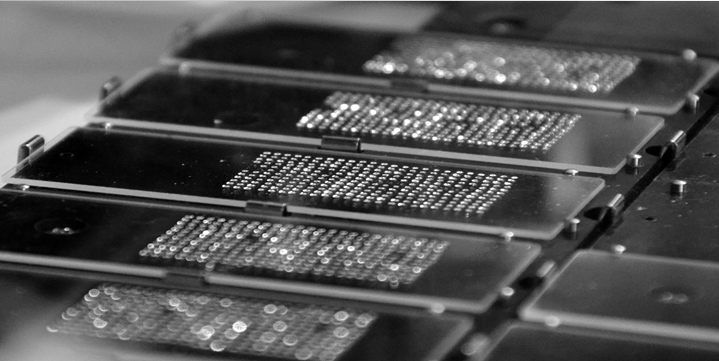Smarter Cancer Detection,
No Blood Required
AI-Powered, Urine-Based Screening
for Early Cancer Detection.
in urine—no blood draws, no invasive procedures.
This breakthrough approach makes early cancer detection faster, more accessible, and patient-friendly.¹
Already available in select global markets.
Working toward U.S. availability through the appropriate regulatory pathways.
The Science Behind PanGIA Biotech's
Breakthrough Technology
PanGIA Biotech has developed a True Liquid Biopsy, using AI to analyze biomolecular changes in urine—no blood, no tissue, just groundbreaking insights.³
A Closer Look at Our Non-Invasive Detection Process
- NuTec Slide Technology captures biomolecular changes in urine, creating a unique colorimetric signature.³
- Functions like a molecular fingerprint—AI deciphers the pattern to distinguish between healthy and cancerous samples.³
- No need for expensive sequencing—improves access and scalability.³

From Sample to Results:
How the Test Works
Step 1:
Collect & Prepare
First-morning urine sample collected at home or in a clinic, then fixed and shipped.²
Step 2:
Activate the NuTec Slide
Sample interacts with hydrogel-coated slides that capture biomolecules.³
Step 3:
Trigger the Reaction
A brief heating process produces a colorimetric change.³
Step 4:
Scan & Analyze
Samples are scanned or uploaded into PanGIA’s proprietary AI software for fast, accurate analysis.³
Step 5:
AI-Powered Insights
Cloud-based AI compares the signature against vast data.²
Step 6:
Receive Actionable Results
Clinicians get a risk-stratified report to guide decisions.¹
Redefining Cancer Screening:
What Makes the PanGIA Platform Different?
Traditional diagnostics often rely on blood draws or biopsies.
PanGIA Biotech offers a non-invasive, AI-powered alternative that uses urine.
- A True Liquid Biopsy – Unlike traditional liquid biopsies that rely on blood-based circulating tumor DNA, PanGIA Biotech’s urine-based test provides a fully non-invasive alternative for early cancer detection.³
- No blood draws. No invasive biopsies. Just a simple urine sample. A seamless experience for patients—no lab visits, no discomfort, no unnecessary stress.³
- AI-powered accuracy delivers consistent, reliable insights. Helping clinicians detect cancer earlier with confidence and clarity.³
- Faster turnaround time—results in as little as 24-48 hours. Because early detection shouldn’t wait.²
- No reliance on molecular sequencing or invasive biopsies—a cost-effective approach to early detection.
- Designed for scalability—from high-tech labs to low-resource healthcare settings.
- Culturally sensitive solution—eliminates barriers for individuals who avoid traditional cancer screening due to invasive procedures or personal privacy concerns.
- Regulatory approval process is underway—clinical validation is in progress for U.S. markets.
Ongoing Clinical Research & Recognition:
Validated by Science
Published Research & Industry Recognition
- Published in The Analyst (Royal Society of Chemistry): Acknowledged for its breakthrough diagnostic potential.³
- U.S. Regulatory Submission in Progress: Key findings are being compiled for regulatory submission.²
Proven in Multi-Center Trials
- GH-215 Prostate Validation Study: A multi-site IRB-approved study with 450+ subjects demonstrating high sensitivity and specificity.¹
- Expanding Our Reach: Additional trials are underway for 10+ cancer types, broadening our impact.²
You Have Qs. We Have As.
Understanding PanGIA Biotech’s AI & Technology
Our AI/ML model is continuously refined using new clinical data to improve accuracy and detect more cancer types as additional validation studies progress.²
Yes, the AI evolves by analyzing more biomolecular signatures from new trials, enhancing precision over time.²
The report provides a risk stratification score rather than a simple “positive/negative” result, helping clinicians make informed diagnostic decisions.¹
NuTec Slide Technology & Interpretation
It captures a biomolecular fingerprint in urine samples, allowing AI to identify disease-specific patterns without requiring genetic sequencing.³
We are working on detailed visuals and interactive content to better explain how the test works.²
Regulatory & Availability
Not yet. PanGIA Biotech’s assays are in the process of U.S. regulatory evaluation and are not available in the U.S. at this time.²
Regulatory timing depends on multiple factors. We are advancing submission preparations and will provide updates as milestones are reached.²
Yes. The PanGIA platform is already in use in India and is preparing for launch in the EU and other international markets as we continue expanding regulatory approvals.²
Clinical Trials & Future Research
Our current focus includes prostate cancer, with clinical trials expanding to 10+ additional cancers in the next phase.
We are partnering with academic institutions, biotech firms, and hospitals to expand validation studies.
Both. PanGIA Biotech assays are developed for early cancer detection and may also support ongoing monitoring of treatment response in future applications.
Comparison to Existing Diagnostic Methods
Traditional methods like PSA and FIT tests have limitations in specificity, invasiveness, and cost. PanGIA Assays provide a non-invasive, urine-based alternative powered by AI. While the prostate cancer assay is the first in clinical validation in the U.S., research is underway to expand detection to additional cancers, including lung, breast, and colorectal.
The PanGIA Platform complements existing tools, helping reduce unnecessary biopsies and improving early-stage detection by providing additional non-invasive insights through AI-analyzed urine samples.
References:
- PanGIA Biotech GH-215 Clinical Study Report, 2024.
- PanGIA Biotech Internal Data, 2023.
- The Analyst, Royal Society of Chemistry, 2022.
